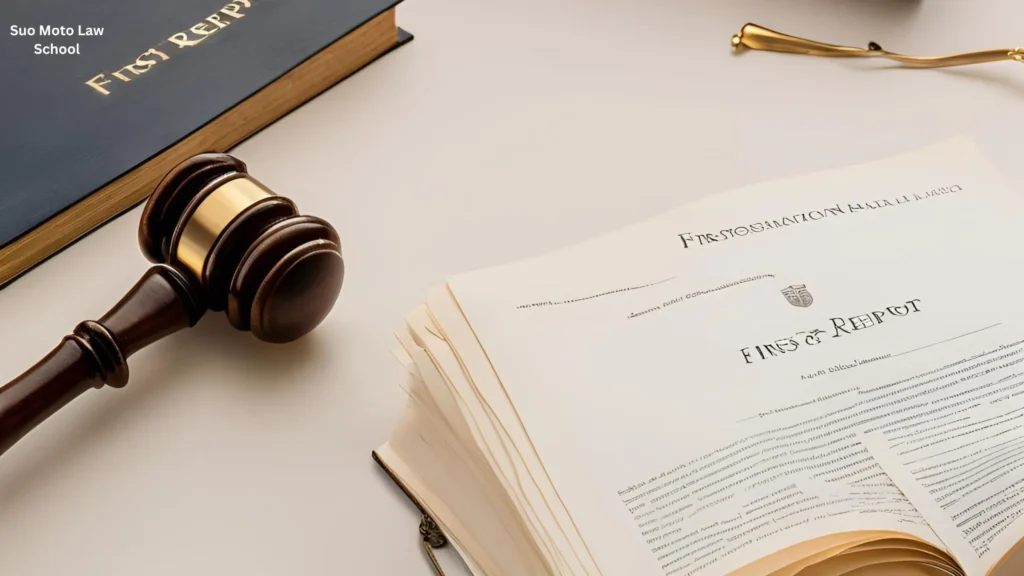Definition of First Information Report (FIR)
The First Information Report (FIR) is a written document prepared by the police when they receive information about the commission of a cognizable offense.
Information about the cognizable offense is popularly known as Ejahar. It is the information about any offense carried to the police station at the earliest opportunity and first in point of time. Based on this information the officer in charge of a police station him/herself or under his/her direction, any subordinate officer records the First Information Report (FIR) and starts an investigation into the offense.
Manner of Lodging First Information Report
According to Section 154 of the Code of Criminal Procedure 1898, every piece of information relating to the commission of a cognizable offense if given orally to an officer in charge of a police station, will be reduced to writing by him or her or under his/her direction and be read over to the informant. Every such information whether given in writing or reduced to writing as aforesaid will be signed by the person giving it, and the substance thereof entered in a book to be kept by such officer in such form as the government may prescribe in this behalf.
Message by Telephone
A message sent by telephone to the police officer and recorded by him or her in his or her station diary which discloses information regarding a cognizable offense is the information within the meaning of Section 154 of the Code of Criminal Procedure 1898. However, a cryptic and anonymous telephone message that does not clearly specify a cognizable offense can’t be treated as a First Information Report. A message given to the police station even if cryptic if it disclosed a cognizable offence may constitute a First Information Report within the meaning of section 154.
In the case of State vs. Dafadar Mafroth Ali Shah (2016) 68 DLR 13, 48 the appellate division observes that a telephonic message which has been recorded by the police officer and starts an investigation based upon the message if it discloses a cognizable offense, the police can treat it as First Information Report.
When the Magistrate directs the police officer to enquire into the complaint of a cognizable offense of which no previous information has been laid before the police, the written information sent by the magistrate to the police will be treated as the First Information Report, according to the Police Regulation of Bengal1943 (PRB), Rule 245 (a).

Essentials/ Characteristics/ Requirements of First Information Report
After scrutinizing Section 154, and taking help from the Case of Kamruzzaman vs. State 23 BLC (HCD) 415, it is found that First Information Report has five characteristics. Those are mentioned below —
- It should be information relating to the commission of a cognizable offense.
- If given orally it is to be reduced to writing by the officer in charge or under his/ her direction.
- Having been thus reduced to writing it should be read over to the informant.
- It should be signed by the informant or his/ her thumb impression be put.
- Its substance should be entered in a book to be kept by the officer in charge in the prescribed form.
Kamruzzaman vs. State 23 BLC (HCD) 415
Section 154 envisages that information regarding cognizable offense must be procured in writing with the signature of the informant and then it is retained in the police station.
According to the Police Regulation of Bengal 1943 (PRB), Rule 243 (c), the information of the commission of a cognizable crime shall be treated as the First Information. It may be given by a person acquainted with the facts directly or on hearsay, but in either case, it constitutes the first information required by law, when hearsay information of a crime is given, the station officer shall not wait to record as the First Information, the statement of the actual complainant or an eye-witness.
Principles a Magistrate Should Keep in Mind Regarding FIR
- A First Information Report can be lodged by any person. He need not necessarily be the victim or the injured or an eye witness.
- Promptness in filing the First Information Report speaks that there is the least possibility of concoction and the report so filed is a strong piece of corroborative evidence. When there is a delay in filing FIR and the delay is not explained, it is fatal.
- Preliminary inquiry/ investigation before recording the First Information Report is not necessary. Because it would destroy the value of the FIR and equally provide room for fabrication of cases.
- An FIR need not contain the facts of the case in all details. It is sufficient if it sets out all the important facts. The court should especially consider who has filed an FIR, whether the eye witness or a person, on the information derived from third persons.
- The absence of the name of the accused from the FIR is however not by itself the proof of the innocence of the accused, not the presence of the name of the accused in FIR is the positive proof of the guilt of the accused.
- The mere fact that the witness is not named in the First Information Report is no grounds for holding that the witness has not seen the occurrence. But the failure to produce witnesses named in FIR is viewed with great concern by the court causing great reflection of the prosecution story. When the informant is not examined, the FIR cannot be admitted in evidence. The writer of the First Information Report must also examine.
Nature of Inquiry Permissible in Recording First Information Report
The investing officer is to satisfy him before he starts recording the report that, relates to a cognizable offence. But beyond this, no inquiry is contemplated by the code. If any information disclosing a cognizable offense is laid before an officer in charge of a police station satisfying the requirements of section 154(1) of the Code of Criminal Procedure, the officer has no other option except to enter the substance thereof in the prescribed form. Reasonableness or credibility of the said information is not a condition precedent for registration of a case.
When information is received and the officer wants to verify the information, he must make an entry in the General Diary, proceed to the spot take a report from a person who is in a position to make a report, and then send the same to the police station for registration of the FIR. The FIR book should not be taken to the spot.
FIR means the report that contains the information about the occurrence that is earned to the police at the earliest opportunity after the occurrence based on which the investigation commences and all subsequent information falls within the purview of Section 161 of the Code of Criminal Procedure (CrPC) 1898. FIR is limited to the first information about some cognizable offense. If an FIR is lodged after a full investigation of a case it becomes doubtful. The principle is that once FIR is recorded all other information subsequently supplied can be looked into and no second FIR needs to be recorded.
Information from more than One Source
The information referred to in Section 154 may come from more than one source and more than one such information may be recorded at or about the same time under this section. However once the police have taken active steps to investigate, any written statement taken by them falls within section 162 of CrPC and is inadmissible in evidence.
Touhid Alam vs. State 38 DLR 289
Whether particular information amounts to an FIR or not is essentially a question of fact which is dependent upon the facts and circumstances of a particular case. In this case, there were two vague and indefinite information in the police station according to which police went to the place of occurrence and subsequently lodged the suo moto FIR.
Information in a police station may come from one source and more than one such information may be recorded at about the same time and it cannot be said as a matter of rule that since one piece of information is earlier in time the later report is no FIR and should be excluded as being hit the Section 162 of the CrPC.

What Information Constitutes First Information Report
What particular information would constitute FIR is always a question of fact depending upon the circumstances of each case. A vague or indefinite information or information that does not disclose cognizable offense cannot be treated as FIR merely because it was received first in point of time. FIR is supposed to contain a narrative of the way the incident has taken place.
When Subsequent/ Supplementary Information is First Information Report
When the police went to the spot after receiving vague information that a murder had been committed in a village, the entry in the station diary containing that vague information cannot be held to be FIR. But the statement recorded on the spot on getting further information should be treated as FIR. Where a piece of information is first given at a beat house and then at a police station, the court can treat the information given at the police station as the FIR since the police took up an investigation on the basis of information given at the police station.
Who may Lodge First Information Report
A person who had witnessed the incident or one who was injured in the incident generally lodges an FIR. If some person had accompanied the injured to the hospital it would not mean that such persons were bound to approach the police for recording the FIR. No legal duty is cast on the police to record the statement of such a person who accompanied the injured in order to initiate an investigation.
First Information Report Lodged by Accused
First Information Report cannot be used as evidence against the maker at the trial, if he himself becomes an accused, nor to corroborate or contradict other witnesses. A confessional FIR by the accused in a police station cannot be used against the accused in view of section 25 of the Evidence Act 1872. But such an FIR is admissible in evidence as against the accused under section 8 of the Evidence Act 1872. If the information given by the accused is not confessional, it is admissible against him as an admission under section 21 of the Evidence Act 1872.
What is not the First Information Report
- Information to police after commencement of investigation.
- Statement of witnesses during the investigation.
- Statement recorded by the officer-in-charge on the basis of his own knowledge after original information.
- The report of the doctor.
- Statement recorded after questioning complainant and witnesses not recorded immediately.

